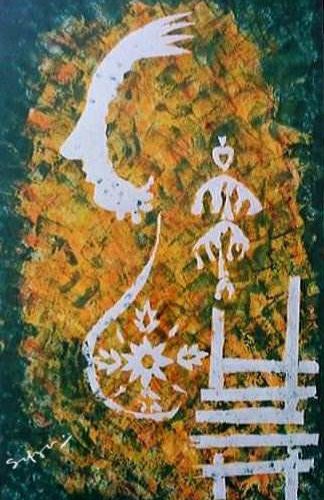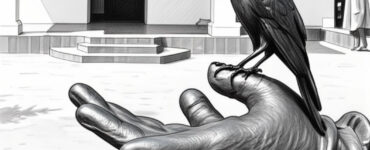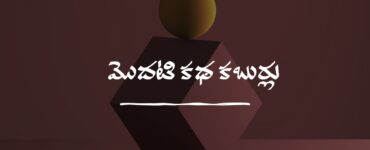Yendluri Sudhakar (1959-), son of migrants from Maharastra, brought up in Hyderabad, has been one of the promising Telugu Dalit poets. He has published four anthologies of poetry of which Darky: A Bilingual Anthology of Poems 1985-2002 was received widely. Though known as a poet, his prose work, Malle Moggala Godudu (1999-) is remarkable for recording memory, employing the Dalit language and asserting the Madiga experience. An academician, who published two works on Gurram Joshua, he teaches at P.S. Telugu University.
The tale is excerpted from Yendluri Sudhakar’s Mallemoggala Godugu, first published in 1999, which is a rare synthesis of autobiography, family narratives and personal narratives – all embedded into one. The title is itself so arresting and imaginative. Mallemoggalu, meaning buds of jasmine is a euphemism for bullock-meat or beef. The term is used in the everyday conversation among the madigas of the coastal Andhra. Godugu, used figuratively is an umbrella. Suggestive of the culture and heritage of the madigas – one of the fifty-nine Dalit communities in Andhra Pradesh – the title stands for the history of exclusion, suffering and protest of the madigas; their aspirations for freedom, dignity and equality. The author rendered these aspects of the madiga life in the form of narratives of the members of his family. Comprising in all twenty-seven, the tales delineate different aspects of the madiga occupation, culture, intra and inter personal relations among the members of the madiga families and between the madigas and upper castes.
* * * *
Last summer, I had been to my village, Raaviguntapalli for attending Sundaramma’s wedding. When I heard of her wedding, I was reminded of a song. The people of the madiga wada used to sing the song.
hold the umbrella of bullock-meat vay
to lady Sundaramma
hold the umbrella of bullock-meat vay
Sundaramma was none other than the daughter of Shanthamma, my sister-in-law. ‘Baava, brother-in-law, the wedding of my daughter Sundaramma has been fixed. You have to attend the wedding at any cost. Our people are all eager to meet you,’ she wrote me a postcard. I had been there for the wedding. When I reached, my relations – brothers-in-law, grandfathers, uncles, aunts and sisters-in-law – surrounded me creating suffocation of sorts.
‘Don’t you allow my baava drink water or something? You’ve all surrounded him!’ when Shanthamma shouted, everyone left the place.
Having eaten sankati I had a nap in the string-cot under the kaanuga tree till the evening. Since the wedding was after two days, I started for Lingareddypalli for the night. We had married our atha, aunt to a man who lives in the village. Mallela Pichaiah, the chief of the madigas was maava, uncle to me by relation. He was about eighty. Even at that age, clods of sankati with bullock curry had to be served to him to make his meals complete! After a great deal of chatting with my foolish maava I asked him, ‘Maava! What was the origin of the madiga caste? Why don’t you let me know about its origin?’ I asked him. I knew it that he would narrate tales so amusingly.
* * *
Who’s Jambavantha?
The one, who was first born.
He was the progenitor of our jati
Listen to me attentively
* * *
In the beginning, there used to be an animal with eight legs, four eyes, four ears and two tails. It was known as Kamadhenu. Brahma, Vishnu, Maheshwara and our thaatha, grandfather Jambavantha were its stakeholders. Kamadhenu was said to be full of nectar. They alone were said to be milking it and churning buttermilk. But the one who had grazed Kamadhenu was never offered anything.
Once Parvathi and Maheshwara were travelling by a chariot, and Parvathi had her menses on the way. It means, don’t you know women’s pollution! That’s it! Then, she had placed the menstrual cloth at a chennangi tree, wore new clothing, and went round the country to watch over their governance. On their way back, a child was heard crying in the menstrual cloth at the chennangi tree. Then she had asked her husband, “Oh my better half! Look, someone is crying over there at the tree. Alight the chariot, and let’s have a look.” When they alighted, there was a boy in the menstrual cloth. They took the boy along with them, and reared him. Who? Parvathi-Parameshwara! When the infant had grown into a boy, they began to send the boy for tending and grazing Kamadhenu. But they were not offering him the nectar or the milk or even the buttermilk! They were simply offering him some scorched rice and water in a pot, and sending him for grazing Kamadhenu.
One morning the boy asked her, “Avva, my mother! Today I’ve to go a long way up to Palagiri-hillocks for grazing Kamadhenu. Put rice into my pot for lunch. I want to start early.”
Having forgotten, she was busy churning buttermilk. The boy reminded her again to put rice in his pot. She put rice in his pot with the same palm she was churning buttermilk. While she was putting the rice into his pot, a drop of buttermilk dripped into his pot. It was nectar! He relished its sweetness while eating the rice. He thought that Kamadhenu’s milk had magical power. Having come back in the evening, “Avva! You’re the one who would never take back the word; tell no lies. You are an unblemished woman. The rice you have served me today is not the one you served me every day. Today’s rice was so tasty. Let me know what it was,” he asked her to tell him the truth.
“My child! The Kamadhenu that you graze gives us milk. I heated the milk, cooled it down and added some fermented curd. Then I churned it into buttermilk. A drop of the buttermilk dripped into your pot. There’s nothing else except this,” she told him
Without speaking anymore, the boy put the flint stones into his pocket for lighting fire, took Kamadhenu, and went away. He tethered it to a tree, bound its four legs, emptied the rice out of the pot, milked Kamadhenu into his pot, and drank.
“Aha ha! The very milk is so nectar-like. How I wonder its meat would taste!” when he thought so, Kamadhenu died crying moo. It died having heard him say, “How its meat would taste!”
Then the boy returned to Jambavantha. “Thaatha, my grandfather! Kamadhenu died,” he told him.
Jambavantha took a knife and an awl. Accompanied by the trio – Brahma, Vishnu, Maheswara – they all went there asking the boy to show it. Then Jambavantha butchered Kamadhenu. He divided the meat into four parts, and weighed them equally.
The three of them asked him, “Eim thaatha! Whose share is less than the other’s?”
“All the three shares are equal!” Jambavantha told them. When they asked him the same question thrice, he answered thrice that all the shares were equal.
Then they picked up the three shares, and went away. He put the remaining meat into the hide, bundled the head and legs, and bound it onto a stick, “Let’s go away lad,” he asked him to carry it home.
He carried it for some distance, and flung it down. “Thaatha! Give me a piece of meat; unless I roast a piece, and eat, I can’t come home,” he grew stubborn. Jambavantha gave him a lump of meat angrily, since they had to traverse through the forest.
Then the boy took the flint stones out of his pocket, made fire, and roasted the piece of meat. When he roasted the piece of meat, the smell wafted around fast. Brahma, Vishnu and Maheshwara learnt about the matter. The three of them came back to the forest along with the three shares of meat, and asked him, “Thaatha, take out your share of meat!” they asked him to weigh the shares as he had done earlier. When weighed, the three shares were equal; but the fourth one was a little less.
“Thaatha! Whose share is this?” the three of them asked him.
“Ayya! My share is a little less,” answered Jambavantha.
They weighed again. When they asked him the same question thrice, he told them thrice that his share was less.
“Thaatha! Since your share is less, your caste is low. So Jambavantha! A hungry age is going to be there in future. You would have to butcher the cattle. You would have to tan the hide. You would’ve to stitch cheppulu, sandal” they cursed him, and went away.
It was said that the one born first in the universe was Jambavantha. But of what use? Since then the offspring of Jambavantha have been stitching cheppulu. The people of this country are slapping on our scalp with the very cheppulu we stitched,’ concluded my foolish maava.
Original: Jambavanthudu maa pichi maava
Translated from the original Telugu by K. Purushotham









నువు చెప్పేది శుద్ద తప్పు.జాంబవంతుడికి కామదేనువును కోయమని శివుడు చెప్పాడు.తర్వాత శివుడు కుండ చేయడానికి కుమ్మరిని పుట్టించాడు.శివుడు మాంసం వండమని జాంబవంతుడికి చెప్పగా జాంబవంతుడు చెన్నయ్యకి చెబుతాడు.ఒక ముక్క కిందపడింది.దానిని వూది కుండలోవేసాడు.దాన్ని చూసిన దేవతలు మేము తినము అని వెళ్ళిపోయారు.అపుడు శివుడు జాంబవంతుడిని నువు వండమంటే మాలవాడికి పని చెప్పావు కాబట్టి నువు అందరి కులాలకు చెప్పులు కుట్టుకుంటూ బతుకు అని చెప్పాడు.మాలవాడిని నువ్వు వూరికి తూర్పుదిక్కున నివసిస్తూ వీధులు శుభ్రం చేసుకుంటూ బతకమని శపించాడు.ఇది అసలైన కథ